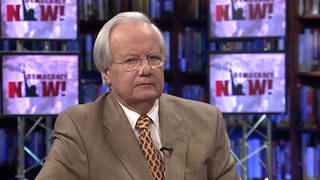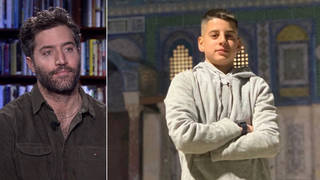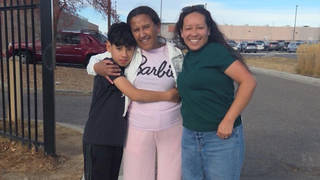
Guests
- Mae Ngaiprofessor of Asian American studies and history at Columbia University.
- Harold Solislegal director at Make the Road New York.
As the Trump administration launches what it touts as the largest mass deportation campaign in U.S. history, we look at how immigrant communities and advocates are fighting back. The administration already faces some setbacks, including in its attempt to end birthright citizenship, which a federal judge halted Thursday from going into effect because it was “blatantly unconstitutional.” Thursday’s ruling is the first in what’s expected to be a long legal battle against Trump’s anti-immigrant agenda. “We’re in a moment where there’s a ton of fear in the community,” says Harold Solis, legal director at Make the Road New York, which has filed its own lawsuit against the government. We also speak with Columbia University historian Mae Ngai, who says the fight over birthright citizenship is part of the long history of restrictionist immigration policies in the country. “What we’re seeing this week is shock and awe. It’s meant to terrorize,” she says. “We have to fight on all levels.”
Transcript
AMY GOODMAN: As the Trump administration launches what it’s calling the largest deportation campaign in U.S. history, we look now at how immigrant communities and advocates are fighting back. A federal judge in Seattle has temporarily blocked President Trump’s executive order aiming to end birthright citizenship for the children of undocumented parents and nonpermanent residents in the United States. Thursday’s ruling by U.S. District Court Judge John Coughenour is the first in what’s expected to be a long legal battle against Trump’s anti-immigrant agenda. The judge described the order as, quote, “blatantly unconstitutional.” He went on to challenge Trump’s lawyers, saying, quote, “Frankly, I have difficulty understanding how a member of the bar would state unequivocally that this is a constitutional order. It just boggles my mind,” the judge said.
The case was brought by a coalition of states: Washington, Arizona, Illinois and Oregon. Washington state Attorney General Nick Brown spoke outside the U.S. district court after the hearing.
ATTORNEY GENERAL NICHOLAS BROWN: This is step one. But to hear the judge from the bench say that in his 40 years as a judge, he has never seen something so blatantly unconstitutional sets the tone for the seriousness of this effort. … I think what the order today reinforces is that no one individual, not even the president of the United States, can simply erase what it means to amend the Constitution and the process therein.
AMY GOODMAN: There were several other lawsuits filed against the executive order, which was one of dozens signed by President Trump in the Oval Office shortly after he was inaugurated on Monday.
STAFFER: This next order relates to the definition of birthright citizenship under the 14th Amendment of the United States.
PRESIDENT DONALD TRUMP: That’s a good one. Birthright, that’s a big one.
REPORTER: What about that one in the courts? That one is likely to be challenged.
PRESIDENT DONALD TRUMP: Could be. We think we have good grounds, but you could be right. I mean, you’ll find out. It’s ridiculous. We’re the only country in the world that does this with birthright, as you know. And it’s just absolutely ridiculous, but, you know, we’ll see. We think it — we have very good grounds.
STAFFER: Sir —
PRESIDENT DONALD TRUMP: People have wanted to do this for decades.
AMY GOODMAN: This all comes as Trump’s federal immigration agents have already arrested over 500 undocumented people and deported hundreds more since Monday. Trump’s so-called border czar, Tom Homan, says the raids are aimed at “sanctuary cities” whose leaders refuse to comply with Trump’s mass deportation plans. On Thursday, ICE agents raided a seafood depot in Newark, New Jersey, taking three people into custody, including a military veteran. Newark Mayor Ras Baraka condemned the warrantless immigration raids, writing, quote, “This egregious act is in plain violation of the Fourth Amendment of the U.S. Constitution … Newark will not stand by idly while people are being unlawfully terrorized,” unquote.
For more, we’re joined by two guests. Here in New York, Harold Solis is the legal director of Make the Road New York. His organization, along with the ACLU and others, also filed a lawsuit against Trump’s executive order ending birthright citizenship. And in Paris, we’re joined by Mae Ngai, Lung Family professor of Asian American studies and professor of history at Columbia University, author of several books, including the award-winning Impossible Subjects: Illegal Aliens and the Making of Modern America. Her new piece for the London School of Economics blog is titled “Trump’s executive order to curtail birthright citizenship is part of the long history of 'alien citizenship' in the US.”
Professor Ngai, we’re going to begin with you. Can you respond to the judge’s ruling in Seattle, Washington, absolutely excoriating the lawyers and also just going after that executive order, saying an executive order cannot overturn the Constitution? Explain what happened.
MAE NGAI: Good morning, Amy. Thanks for having me.
The judge is absolutely correct: It’s blatantly unconstitutional. The president cannot change the Constitution. But here’s the thing. When Trump says this idea has been around for a long time, it’s true. It’s been introduced into the Congress since the 1990s. People considered it a wacko idea. Its main theorist and architect is John Eastman, who we know more recently from the efforts to overturn the 2020 election, right?
So, what Eastman is proposing and what Trump is arguing is not actually technically overturning the 14th Amendment. They want to reinterpret one phrase in it so that they can’t exclude the children of undocumented immigrants from citizenship. So, they don’t think they’re overturning it, which they know is a long road. They just want to tweak what the interpretation of jurisdiction means, who is subject to the jurisdiction of the United States.
AMY GOODMAN: Explain exactly the 14th Amendment and the levels of challenge, I mean, what an executive order is and what an amendment to the Constitution is, and where this goes from here.
MAE NGAI: The 14th Amendment is passed after the Civil War. And this section on citizenship is aimed specifically to overturn the Dred Scott ruling, which we all know said that Black people have no rights and are not citizens of this country. So, after the Civil War, the Constitution was amended to make them all citizens by saying all persons born and naturalized in the United States, and subject to the jurisdiction thereof, are citizens of the United States and the state wherein they reside.
Now, what Trump wants to do is to reinterpret the meaning of “subject to the jurisdiction thereof” by saying that doesn’t — the undocumented migrants are not welcome here, they were not invited, so they’re not part of the jurisdiction. But that’s a false argument. It’s long been held that only foreign diplomats are not subject to the jurisdiction of the United States. That’s what we call diplomatic immunity. Now, anybody who knows anything about American life knows that everybody on American soil is subject to domestic law. An undocumented immigrant who gets a speeding ticket is subject to American law. So this is really a bogus argument.
But they are hoping that they can go before the Supreme Court, which has been very favorable to Trump. And this is why we have concern, I think, to worry. The Seattle judge was absolutely correct that this is blatantly unconstitutional. It’s outrageous. But we now have a court that has given the president immunity, basically unlimited immunity. This court also would not consider disqualifying him from the ballot on grounds that he’s an insurrectionist. So, the court is, to many people’s minds, including mine, very clearly politicized and political. And this is where we have, I think, reason to worry, notwithstanding the unconstitutionality of the order.
AMY GOODMAN: Harold Solis, you’re with Make the Road New York. You also have sued, along with the ACLU, around birthright citizenship. Explain the basis of your suit and how it relates — what happens now that the judge has struck this down, saying he’s almost never seen anything like this in his decades on the bench?
HAROLD SOLIS: Sure. Thank you, Amy. And thank you for having me on.
Just as Mae was discussing — right? — the basis of the 14th Amendment, its important history, that’s all what’s been animating our concern around this idea of ending or curtailing birthright citizenship. You know, I can say from the get-go that, unfortunately, this was something that we anticipated for quite some time. You know, the Trump campaign, during the campaign trail and shortly after the election, was already telegraphing that this was something that they were going to act on from day one. And so, it was already on top of — you know, at the top of our minds, at the top of our members’ minds, as something that we needed to be prepared for.
And so, the basis of our lawsuit is exactly this — right? — that the 14th Amendment is in the Constitution, and that no president, no matter what political party — right? — should be allowed to revise it, to erase it, to turn it on or off based on the political winds of the day. You know, we are deeply concerned about this, because it represents a Pandora’s box that, if left open, if we allow any president to open it, the consequences would be devastating.
AMY GOODMAN: So, what happens with your suit?
HAROLD SOLIS: So, our lawsuit is moving currently in New Hampshire. And there, you know, currently, we are set to argue for preliminary injunctive relief in early February. And so, both lawsuits are walking, you know, in tandem in some ways.
The basis of our lawsuit — right? — is that we have members who are going to be directly impacted by this executive order. We have families in our membership that are, you know, waiting, have been here for years and have been deeply concerned about what this executive order could mean for them and their soon-to-be-born children, right? I mean, this executive order targets children who are going to be born, who otherwise would be entitled to all the protections that the Constitution affords.
AMY GOODMAN: So, at the same time all of this happened yesterday, you also have this immigration raid in Newark, New Jersey. Can you talk about the significance of this and the mayor of the city, Ras Baraka, fiercely critical of what took place?
HAROLD SOLIS: I think he’s right to be fiercely critical of what took place. You know, I think many of us woke up this morning to the news of what was happening there. I think we all saw reports of even U.S. citizens being impacted by the raid. This sort of, you know, escalation in enforcement is something that we’ve been deeply concerned about. It’s something that I think sometimes in the public mind we like to think that, you know, when we talk about immigration, it’s only something that affects immigrants. But actually — right? — these sorts of tactics have an impact on everybody in our communities. And so it’s deeply concerning. It’s great that the mayor is standing by, you know, his — the laws and the policies that are in place there, and by his residents, as well.
AMY GOODMAN: I mean, people might be surprised to know that the Trump administration has directed federal prosecutors nationwide to investigate and potentially bring criminal charges against city and state officials, presumably, you know, in sanctuary states and cities, who are resisting these kinds of actions, anti-immigrant actions, like the raids.
HAROLD SOLIS: Right, yes. I mean, this is opening up a front, again, that he’s also been telegraphing for quite some time. You know, this is another one of those moments where we have to be thoughtful about how we’re thinking about these threats that are coming from the White House. You know, these laws, these local laws and policies that have been put in place throughout the country in many jurisdictions, including here in New York City, are also grounded in constitutional principles, including the fact that both states and cities — right? — cannot be forced to — you know, cannot be forced to do the federal government’s job, essentially.
AMY GOODMAN: So, you’re here in New York, Make the Road New York. Explain what it is to be a sanctuary city.
HAROLD SOLIS: Sure. I mean, I think, you know, there is no one single legal definition of what it means to be a sanctuary jurisdiction, but, essentially, I think what many people agree upon is that it means being a welcoming place — right? — a place where the jurisdiction is not looking to do more harm, number one, to its residents, and, number two, that it is not going to dedicate its time, its resources — right? — to doing something that is, as the federal government knows, is principally their responsibility. So, in some ways, it’s not that the jurisdiction is impeding any immigration efforts. It’s simply that they’re not going to go hand in hand and do the job with the federal government.
AMY GOODMAN: So, what about the Trump administration saying they will allow ICE to conduct raids at churches, hospitals, schools? How are you preparing for this? And also, explain the whole “Know Your Rights” movement — I am sure Make the Road is a part of this — all over the country, where people are trying to educate others, immigrant and nonimmigrant, about what to do in the case of an ICE raid, an ICE agent walking on the street, an ICE agent knocking on your door, what your rights are.
HAROLD SOLIS: Yeah. Look, I’m going to be honest with you. We’re in a moment where there’s a ton of fear in the community, right? We’re hearing about birthright citizenship being attacked, right? And that’s deeply unsettling to people who, up until last week, maybe they didn’t have to worry about what their citizenship meant in this country. So, we’re hearing some real concerns about that. And, yes, now you have this flurry of attacks and threats coming out of the White House that is supposed — you know, that is sending this message that even places like hospitals, schools, churches, houses of worship might also be targets of ICE enforcement. And so, understandably, people are asking questions about what this means for them and their daily lives.
I’ll say two things. One, yes, we are deeply concerned about this rescission of this memo that in the past has sort of governed ICE’s ability to enter these sensitive locations — hospitals, schools, etc. But we also know that that’s the reason why we have some of these local laws and policies in place, which is to give people some reassurance that they can go about their daily lives without worrying that ICE is going to show up, you know, at the hospital.
AMY GOODMAN: And people are afraid to go to school.
HAROLD SOLIS: I’m hearing this from parents.
AMY GOODMAN: People are afraid to go to work.
HAROLD SOLIS: I’ve been getting this question all week long: Can I send my kids to schools? Parents have enough on our minds — right? — to have to be worrying about whether their kid is safe enough to be in school, where they should be paying attention, where they should be focusing on their academics, not worrying if they’re going to get picked up or if someone else who works at a school is going to get picked up. This is not what schools are for. And I’ve been getting this question throughout the week.
We’ve been working day and night. You know, I’m lucky to work with a team of amazing organizers, lawyers, health advocates, teachers, who for the last few months have been doing everything possible to spread the news about what are people’s rights in our communities, so that they can get some sense of hope and knowledge in a time that is filled with fear.
AMY GOODMAN: Mae Ngai, we’re going to give you the last word. You have studied this issue for decades. You’re not inside the United States right now, where you usually are. But everything from birthright citizenship to the raids have begun, and the threats to officials if they try to stop these raids, and the idea that schools, churches can be raided by ICE?
MAE NGAI: I think what we’re seeing this week is shock and awe. It’s meant to terrorize immigrants in their communities, their families. It’s meant to terrorize and make fearful elected officials, leaders of organizations. It’s a big shock and awe. How much they will continue to do this remains to be seen. I think they’re serious. I think we should be very worried. But it’s not clear to me that they can actually deport 11 million people. It’s wildly expensive and difficult to do. Can he deport a million people a year? Even that’s difficult. But they’re going to make a big show of this and terrorize our communities.
And I think we have to fight on all levels, in the communities, in the courts. And the political and legal situation does not look great for us, I’m afraid, because I think the Supreme Court may very well go along with some of this, both on the 14th Amendment and on the 10th Amendment, which is the amendment that says that states and local governments cannot be forced, cannot be coerced into enforcing federal laws. So, we’ll see how this goes. I think we should be very concerned and pay close attention.
AMY GOODMAN: Mae Ngai, professor of Asian American studies and history at Columbia University, speaking to us today from Paris, France, and Harold Solis, legal director at Make the Road New York.
Coming up, the posthumous pardoning of the Black nationalist leader Marcus Garvey, it was one of President Biden’s last acts in office. Stay with us.













Media Options